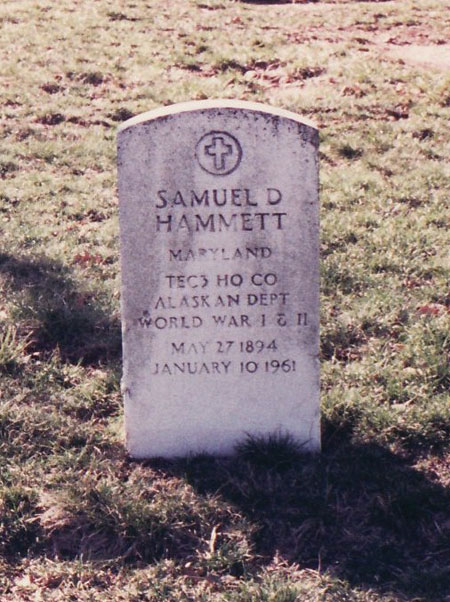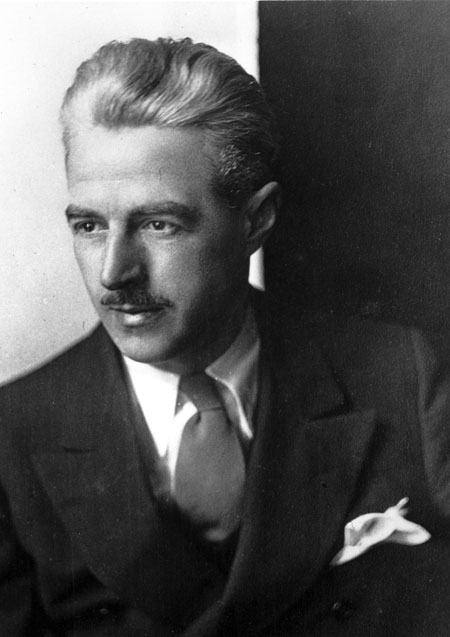dashiell hammet
Samuel Dashiel Hammett died in Lennox Hill hospital, New York, on the 10th of January, 1961. They buried him in the famous Arlington military cemetery. That must have been the only honour that his country's authorities ever gave him. And, in fact, they didn't really give it to him: he earned it himself by fighting in both World Wars as a volunteer. Hammett spent the last ten years of his life in the bucolic town of Katonah, far from the city streets he loved so much. The heart attack he had in 1955, which was brought on by alcohol abuse, forced him into retirement. If it hadn't been for writer Lillian Hellman's help, Hammet would have committed suicide long before that. They met in 1931 and, although they never married, their up-and-down relationship was Hammet's lifebuoy on several occasions.
Samuel Dashiell Hammett was born on a farm in Maryland in 1894. He left school at 13 and did many different jobs before getting a position at the famous Pinkerton National Detective Agency. He volunteered as an ambulance driver during the First World War. He caught tuberculosis and it was then that he started drinking. Once back from the war, he started working in publicity and, at the same time, started to write. His first works were published in Black Mask magazine under the nom-de-plume Peter Collision. He wrote Red Harvestand The Dain Curse in 1929 and his most famous work in 1930: The Maltese Falcon. It was an immediate success. Having worked in the Pinkerton detective agency and his habit of almost drinking himself to death in dark bars helped him considerably in reflecting the world of crime and the atmosphere on the streets. Hammett's detective Sam Spade isn't as ironic or as sharp as Philip Marlowe, who Raymond Chandler was later to create, but he was more believable. Spade's cynicism is in line with the corruption and vice of power and rings true to the reader.
Hammett had a short literary career. In 1934 he wrote his last novel, Blood Money. Being left-wing, he signed up to the Communist Party. In 1942, wanting to fight fascism, he joined the army once more. As he was seriously ill with tuberculosis and alcoholism, they sent him to the Aleutian Islands. He spent the Second World War there. On returning, he joined the New York Civil Right Congress association. The US government was not ever going to leave him alone again. During the blacklist era he was arrested and interrogated time and time again. In 1951 they imprisoned him for six months because he did not want to disclose information. He did not denounce anybody and paid for that by being forgotten over the next decades: he never regretted it. On the 50th anniversary of his death, it would be good to remember that Hammet, as well as his contribution to literature, deserved to be buried in the American heroes' cemetery at Arlington.
Bibliography:
Red Harvest (1929)
The Dain Curse (1929)
The Maltese Falcon (1930)
The Glass Key (1931)
The Thin Man (1934).
Blood Money (1943)
Samuel Dashiell Hammett was born on a farm in Maryland in 1894. He left school at 13 and did many different jobs before getting a position at the famous Pinkerton National Detective Agency. He volunteered as an ambulance driver during the First World War. He caught tuberculosis and it was then that he started drinking. Once back from the war, he started working in publicity and, at the same time, started to write. His first works were published in Black Mask magazine under the nom-de-plume Peter Collision. He wrote Red Harvestand The Dain Curse in 1929 and his most famous work in 1930: The Maltese Falcon. It was an immediate success. Having worked in the Pinkerton detective agency and his habit of almost drinking himself to death in dark bars helped him considerably in reflecting the world of crime and the atmosphere on the streets. Hammett's detective Sam Spade isn't as ironic or as sharp as Philip Marlowe, who Raymond Chandler was later to create, but he was more believable. Spade's cynicism is in line with the corruption and vice of power and rings true to the reader.
Hammett had a short literary career. In 1934 he wrote his last novel, Blood Money. Being left-wing, he signed up to the Communist Party. In 1942, wanting to fight fascism, he joined the army once more. As he was seriously ill with tuberculosis and alcoholism, they sent him to the Aleutian Islands. He spent the Second World War there. On returning, he joined the New York Civil Right Congress association. The US government was not ever going to leave him alone again. During the blacklist era he was arrested and interrogated time and time again. In 1951 they imprisoned him for six months because he did not want to disclose information. He did not denounce anybody and paid for that by being forgotten over the next decades: he never regretted it. On the 50th anniversary of his death, it would be good to remember that Hammet, as well as his contribution to literature, deserved to be buried in the American heroes' cemetery at Arlington.
Bibliography:
Red Harvest (1929)
The Dain Curse (1929)
The Maltese Falcon (1930)
The Glass Key (1931)
The Thin Man (1934).
Blood Money (1943)




